Domestic solar panel installation transforms your home into a clean energy generator, reducing electricity bills whilst protecting against rising energy costs. At Spectrum Energy Systems, established in 2011, we’ve helped hundreds of East Midlands homeowners harness solar power through professional, MCS-accredited installations designed specifically for UK homes.
Whether you’re looking to slash your energy bills, increase your property value, or reduce your carbon footprint, our comprehensive domestic solar solutions deliver reliable performance backed by decades of combined engineering experience across Nottingham, Derby, Leicester, and Lincoln.
Benefits of Domestic Solar
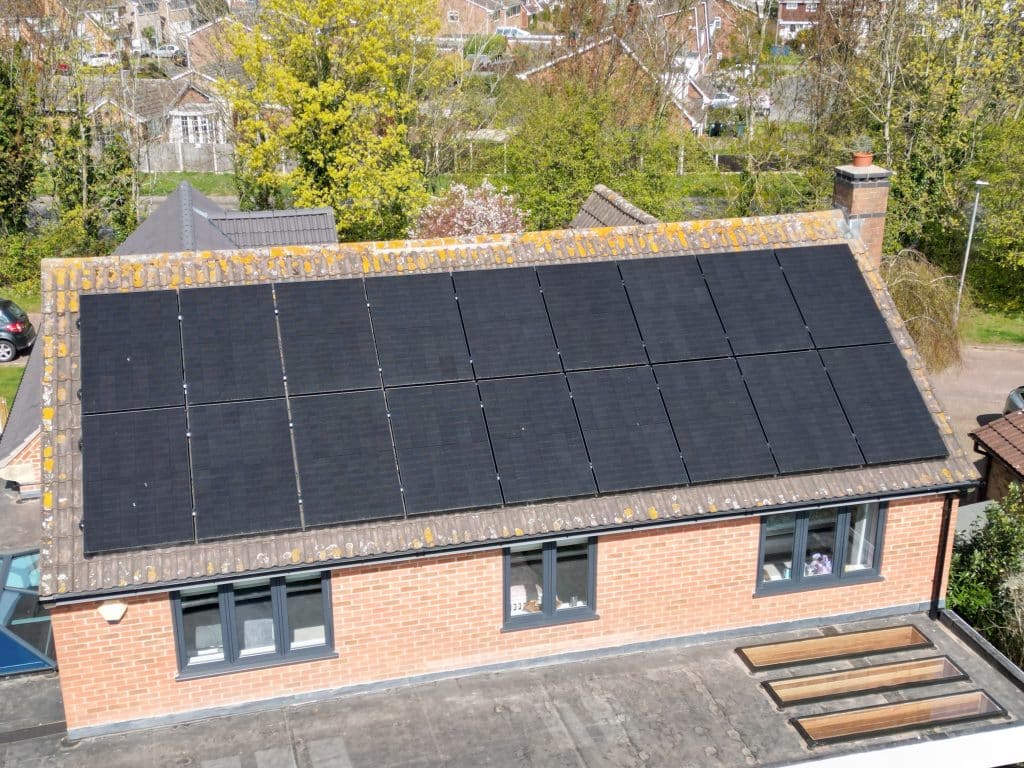
UK homeowners choosing solar panel installation typically benefit from significant electricity bill reductions, with many systems covering 40-70% of household consumption. The financial advantages extend beyond immediate savings—solar panels can increase property values by 2-3% according to recent studies, whilst protecting you from volatile energy price fluctuations.
Environmental benefits are equally compelling. A typical 4kW domestic system prevents approximately one tonne of CO2 emissions annually—equivalent to planting 50 trees or taking a car off the road for several months. With the Smart Export Guarantee (SEG), any excess electricity you generate earns payments from your energy supplier, creating an additional income stream.
Energy independence represents perhaps the most valuable long-term benefit. By generating your own electricity, you gain control over your energy supply, reducing reliance on grid electricity and volatile wholesale prices. When combined with battery storage solutions, you can maximise self-consumption and maintain power during grid outages.

How Solar Works for Homes
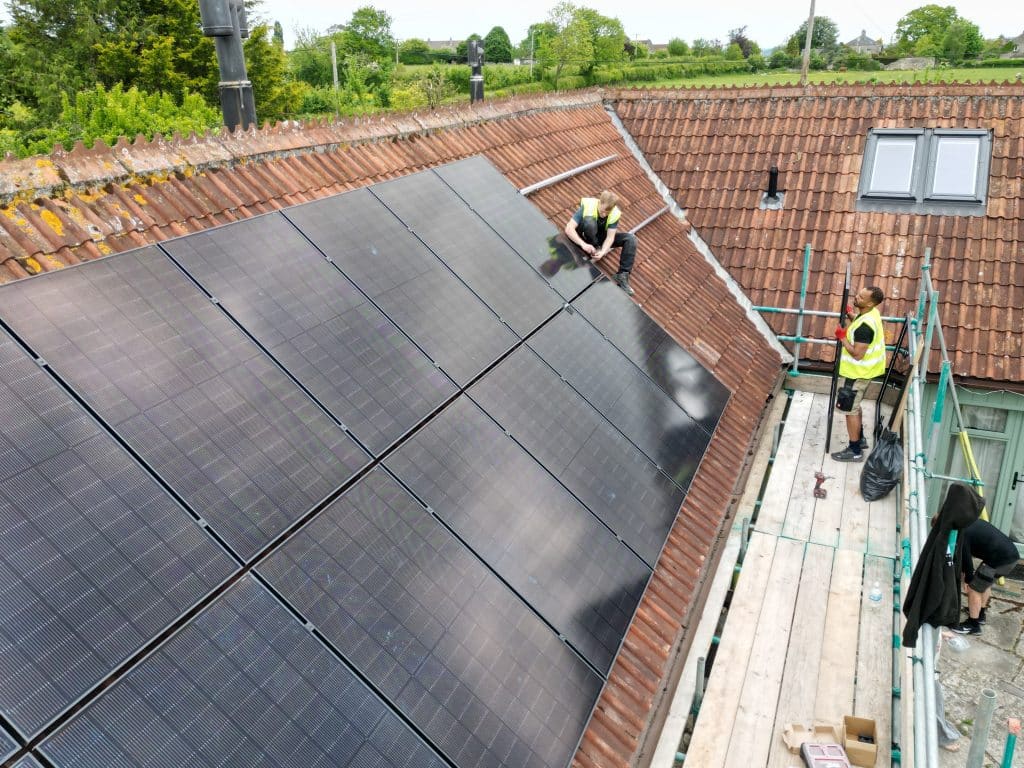
Solar photovoltaic (PV) panels capture sunlight and convert it into direct current (DC) electricity through semiconductor technology. This DC electricity flows to an inverter, which converts it into alternating current (AC) electricity compatible with your home’s electrical system and appliances.
Your solar system connects to your existing electrical supply, allowing you to use solar-generated electricity as your primary power source. When your panels produce more electricity than you’re consuming, the excess automatically feeds back to the grid (earning you SEG payments), or stores in a battery if you’ve installed one. When panels aren’t generating sufficient power—during evenings or heavily overcast days—your home draws electricity from the grid as normal.
Modern smart monitoring systems track your generation, consumption, and grid import/export in real-time, helping you optimise usage patterns and maximise savings. The entire process is automatic, requiring no manual intervention beyond occasional system checks.

Is Your Home Suitable?
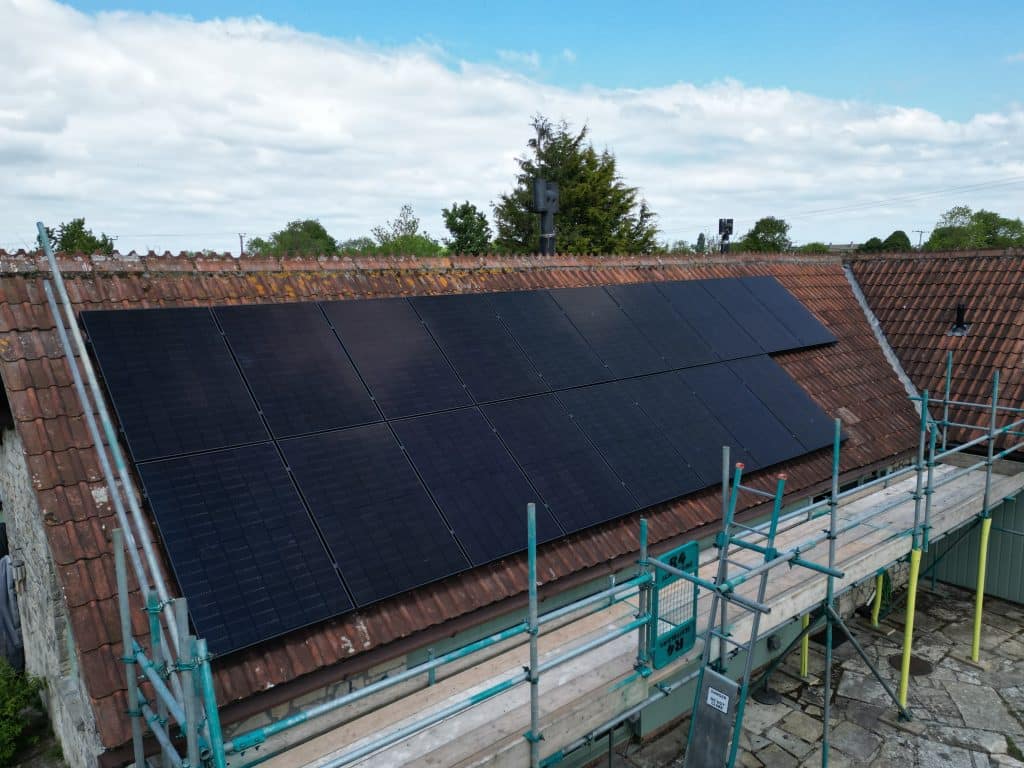
Most UK homes are excellent candidates for solar panel installation, though several factors influence system performance and suitability. Roof orientation significantly impacts generation—south-facing roofs perform optimally, though east and west-facing installations still deliver strong returns, typically achieving 80-90% of south-facing performance.
Roof angle affects efficiency, with 30-40 degree pitches considered ideal for UK latitudes. However, modern panel technology performs well across various angles, and our engineers optimise mounting systems to maximise capture regardless of existing pitch. Shading requires careful assessment—nearby trees, chimneys, or neighbouring buildings casting shadows can reduce output, though power optimisers and strategic panel placement often mitigate these challenges.
Structural integrity matters equally. Your roof must support approximately 15-20kg per square metre for standard panels and mounting systems. Properties requiring roof repairs should complete these before installation, and our expert installation team conducts thorough structural surveys as part of every project. Ground-mounted systems offer alternatives when roof installation isn’t viable.
Listed buildings and properties within conservation areas require planning permission, though the vast majority of UK homes benefit from permitted development rights, allowing installation without formal applications. Our team handles all necessary compliance checks and documentation.

System Components
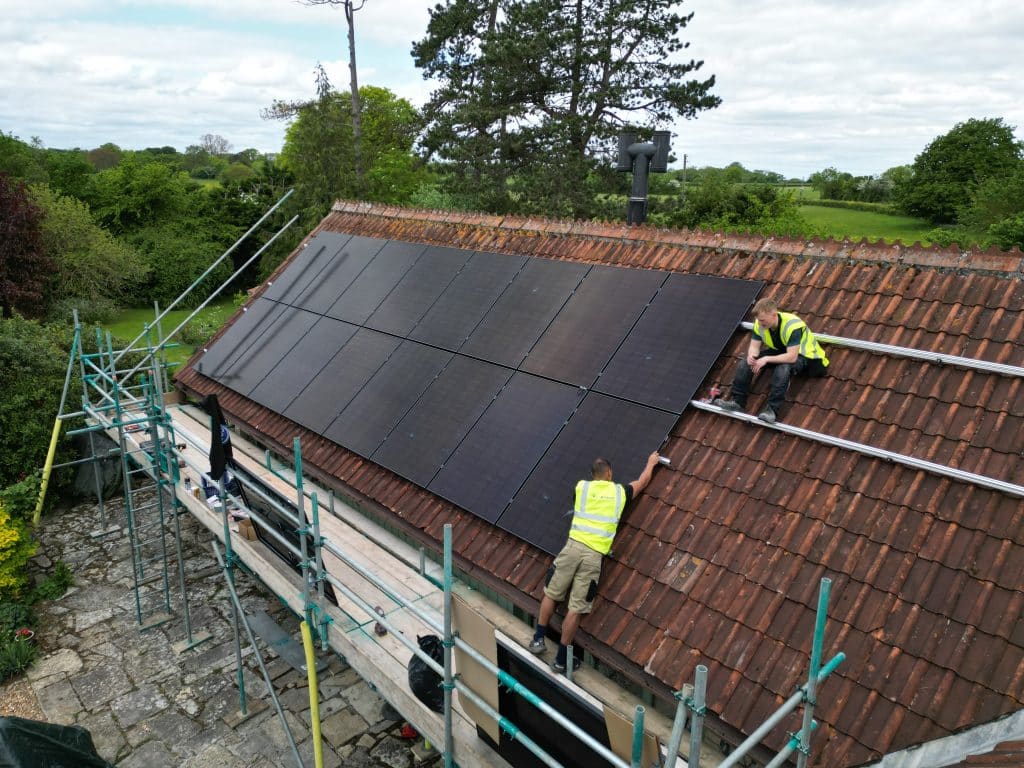
High-quality solar panels form the foundation of your domestic system. Modern panels typically deliver 350-450 watts per panel, with premium options exceeding 500 watts. We recommend Tier 1 manufacturers offering robust 25-year performance warranties and proven degradation rates below 0.5% annually. Choosing the right solar panel involves balancing efficiency, aesthetics, warranty terms, and budget.
Inverters convert DC panel output into useable AC electricity. String inverters suit straightforward roof layouts, whilst microinverters excel in complex installations with multiple roof planes or shading concerns. Hybrid inverters integrate battery storage capability, future-proofing your system for energy storage additions. Quality inverters typically last 10-15 years, with manufacturers providing warranties matching this lifespan.
Battery storage, whilst optional initially, transforms solar systems from grid-tied installations into comprehensive energy management solutions. Home battery systems store excess daytime generation for evening use, maximising self-consumption and enabling backup power during outages. Modern lithium batteries offer 5-15kWh capacities with 10-year warranties and minimal maintenance requirements.
Mounting systems secure panels to your roof whilst maintaining weatherproofing. Aluminium rails and stainless steel fixings provide durability against UK weather conditions. Proper installation includes detailed roof surveys, appropriate flashing, and weatherproof sealing—critical elements our MCS-accredited installers execute to Building Regulations standards.

UK Incentives for Solar
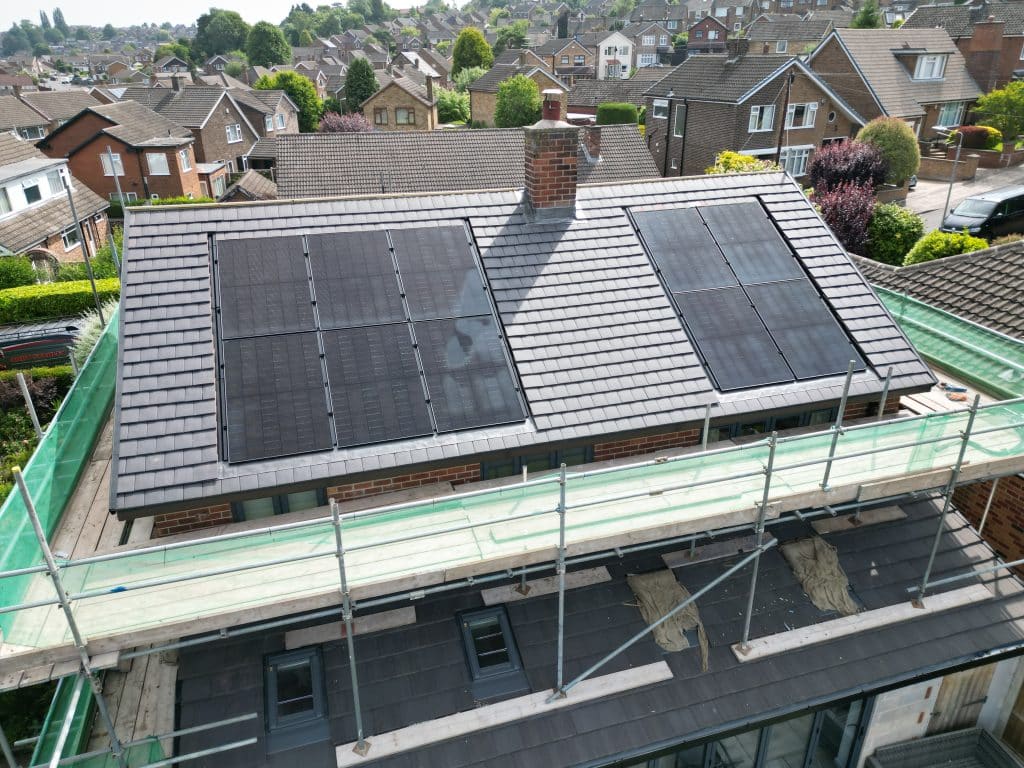
The Smart Export Guarantee (SEG) requires licensed electricity suppliers to pay households for exported solar electricity. SEG rates vary by supplier, typically ranging from 4p-15p per kWh exported, with variable and fixed-rate options available. Selecting optimal export tariffs can add £100-£300 annually to your returns, depending on system size and generation patterns.
VAT on domestic solar installations is currently charged at 0% for energy-saving materials, significantly reducing overall costs. This applies to panels, inverters, batteries, and installation labour, representing substantial savings versus standard VAT rates.
Local authority schemes occasionally offer additional support. Nottingham City Council decarbonisation grants, for example, have provided funding for energy efficiency improvements including solar installations. Energy Company Obligation (ECO) schemes may support eligible households through energy suppliers—contact your provider to explore current offerings.
Our team stays current on available incentives and guides you through application processes, maximising financial support for your installation.

Residential Solar Installation Process
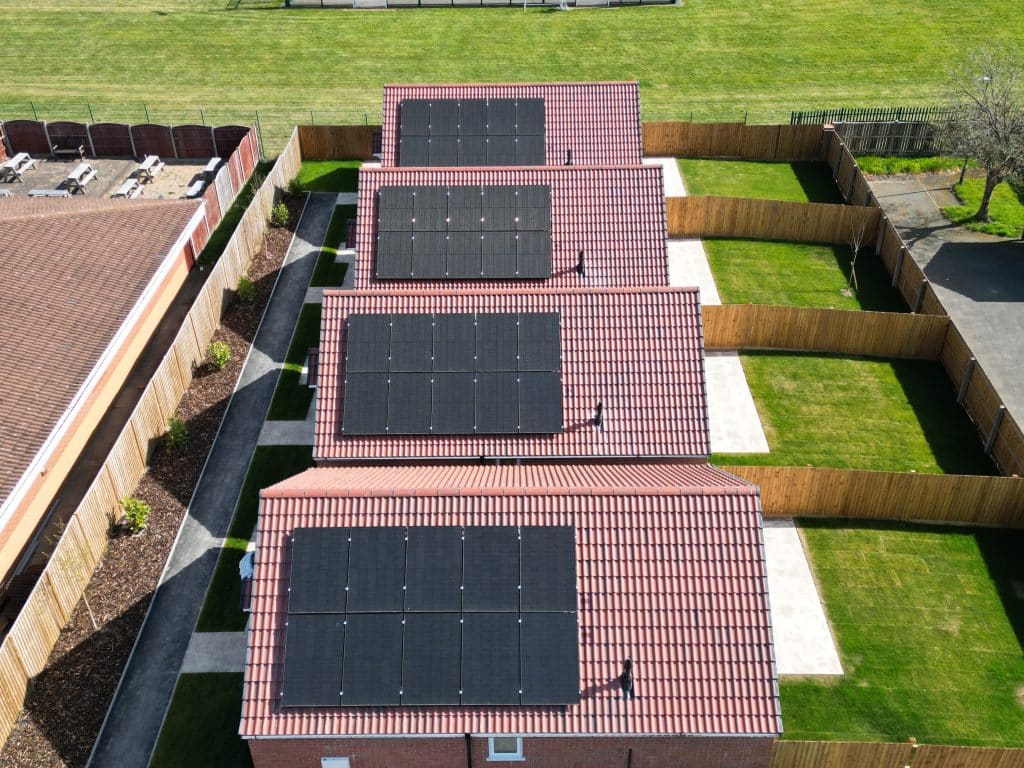
Professional solar panel installation follows a structured process ensuring safety, performance, and regulatory compliance. Your journey begins with a comprehensive site survey where our engineers assess roof condition, orientation, structural integrity, electrical systems, and any potential challenges. This survey informs detailed system design optimised for your property and energy consumption.
Following survey completion, we produce detailed proposals including system specifications, performance projections, costs, and timelines. Once you approve, we handle all administrative requirements—MCS notifications, DNO (District Network Operator) applications if required, Building Regulations compliance, and any necessary planning permissions.
Installation typically occurs 4-8 weeks after contract signing, depending on equipment availability and DNO response times. The physical installation usually completes within 1-2 days for standard domestic systems. Our installers begin by establishing safe working areas and protecting your property, then proceed with mounting system installation, panel placement, electrical wiring, inverter installation, and final connections.
Following installation, systems undergo commissioning tests verifying correct operation, safety, and performance. We configure monitoring systems, demonstrate operation, and provide comprehensive handover documentation including warranties, maintenance guidelines, and system specifications. Our ongoing support services ensure your system maintains optimal performance throughout its lifespan.

Domestic Solar Installation Timeline
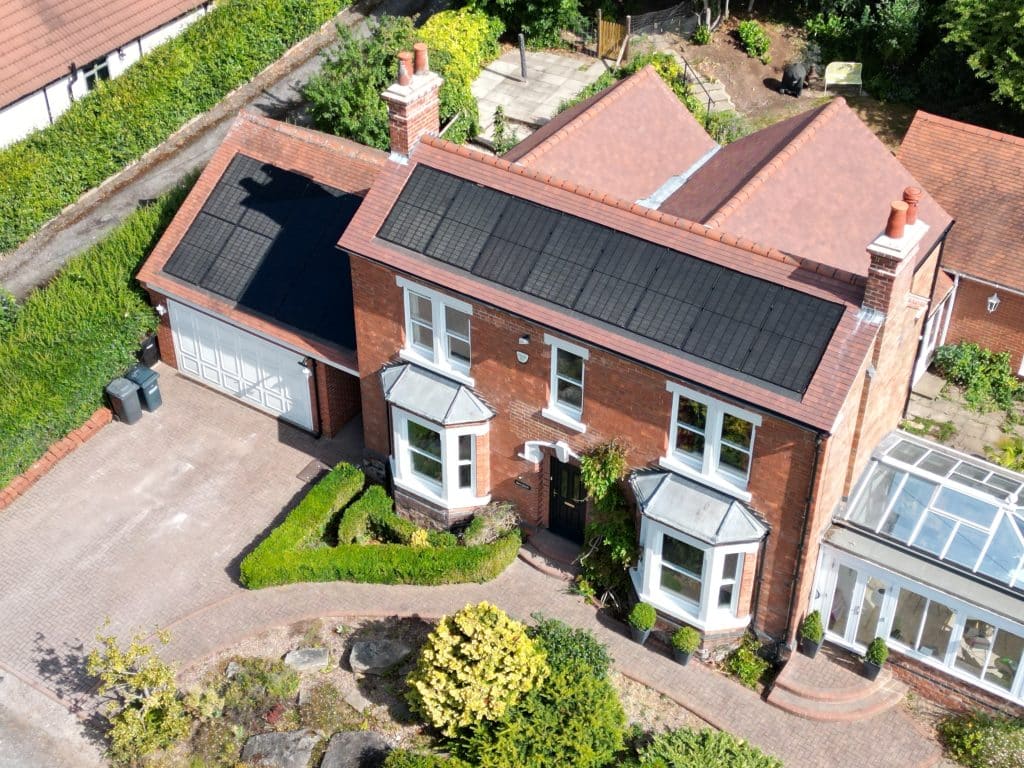
From initial inquiry to generating your own electricity typically spans 6-12 weeks, though timelines vary based on several factors. Initial consultations and detailed quotes usually occur within 7-10 days, allowing you to review proposals and ask questions before committing.
Once contracted, system design and DNO applications (if required) take 2-3 weeks. Standard domestic installations under 3.68kW typically require only notification to your electricity network operator, enabling faster deployment. Larger systems requiring formal DNO approval may add 2-4 weeks to timelines, depending on network operator response speeds.
Equipment procurement takes 1-3 weeks for standard components, though supply chain factors occasionally extend this period. We maintain relationships with multiple suppliers, minimising delays through proactive stock management and flexible sourcing.
Installation itself completes rapidly—typically 1-2 days for most domestic systems. Following installation, commissioning and final inspections usually occur within 1 week, after which your system begins generating electricity immediately. Our project coordinators maintain regular communication throughout, keeping you informed of progress and any timeline adjustments.

Battery Storage Integration
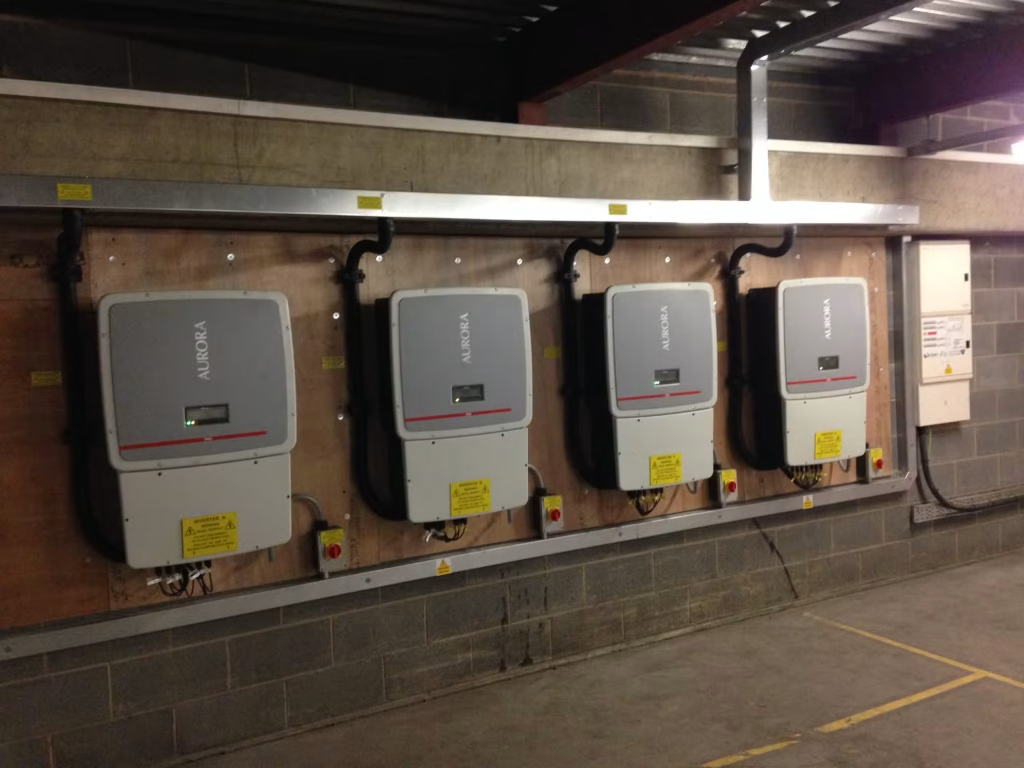
Adding battery storage to solar panel systems maximises self-consumption and energy independence. Batteries store excess daytime generation for use during evenings, overnight periods, or grid outages, potentially increasing solar electricity usage from 30-40% to 70-85% of total generation.
Battery sizing depends on consumption patterns and energy goals. Typical UK homes benefit from 5-10kWh capacity, storing sufficient energy for evening and morning consumption whilst balancing cost-effectiveness. Larger batteries suit households with electric vehicles, heat pumps, or higher evening consumption.
Modern lithium batteries offer 5,000-10,000 charge cycles—effectively 10-15 years of daily cycling—with warranties typically covering 10 years or specified cycle counts. Integration with smart EV charging systems creates sophisticated energy management, prioritising solar charging and minimising grid reliance.
Battery storage adds £3,000-£6,000 to installation costs but delivers substantial benefits for many households. Our energy consultations include detailed consumption analysis, determining whether battery additions suit your circumstances and usage patterns. Systems can also accommodate future battery retrofitting, allowing phased investment as budgets permit.

Smart Home & EV Charging
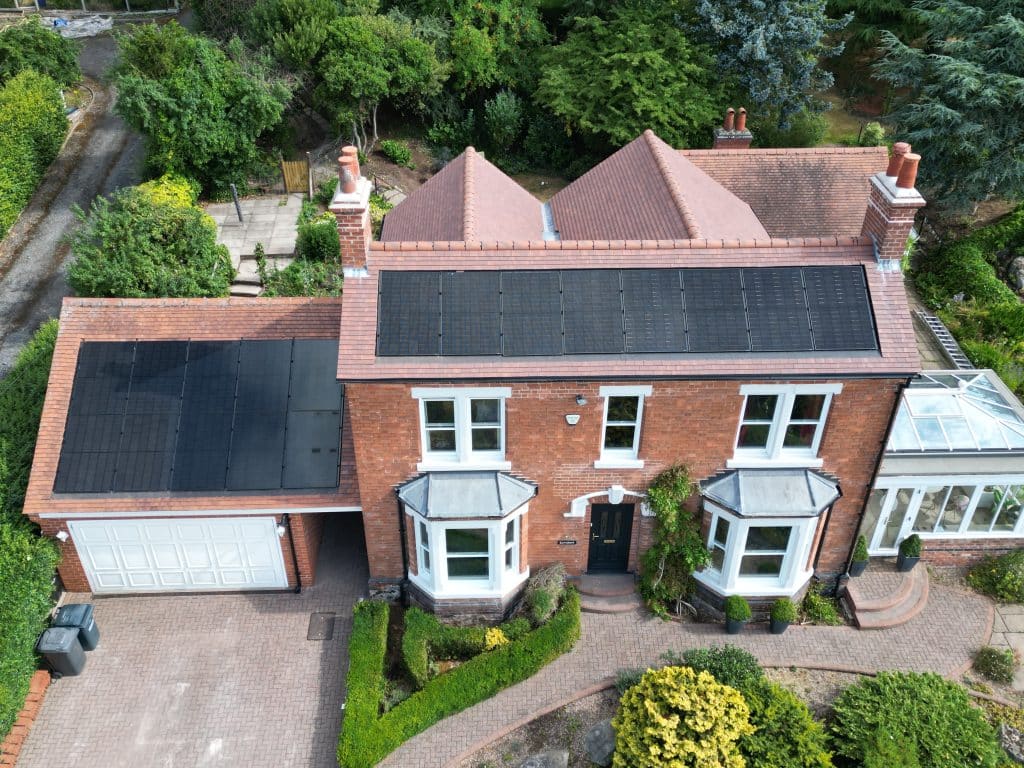
Modern solar installations integrate seamlessly with smart home technologies and electric vehicle charging infrastructure. Smart energy management systems optimise consumption automatically, directing solar generation to highest-value uses—powering immediate loads, charging batteries, or exporting to grid—based on real-time conditions and your preferences.
Electric vehicle charging represents ideal solar applications—EVs typically charge overnight or during work hours when traditional peak solar generation occurs. Smart EV chargers coordinate with solar systems, prioritising clean, free solar electricity for vehicle charging whilst maintaining grid backup when solar generation insufficient. A typical EV requiring 30kWh weekly could save £300-£500 annually versus grid-only charging, depending on tariffs and driving patterns.
Remote monitoring via smartphone apps provides real-time visibility into generation, consumption, and system health. Most modern systems include alerts for performance anomalies, enabling prompt attention to any issues. Historical data tracking helps identify consumption patterns and optimise usage behaviours, maximising financial returns from your solar investment.

Planning Permission for residential Solar
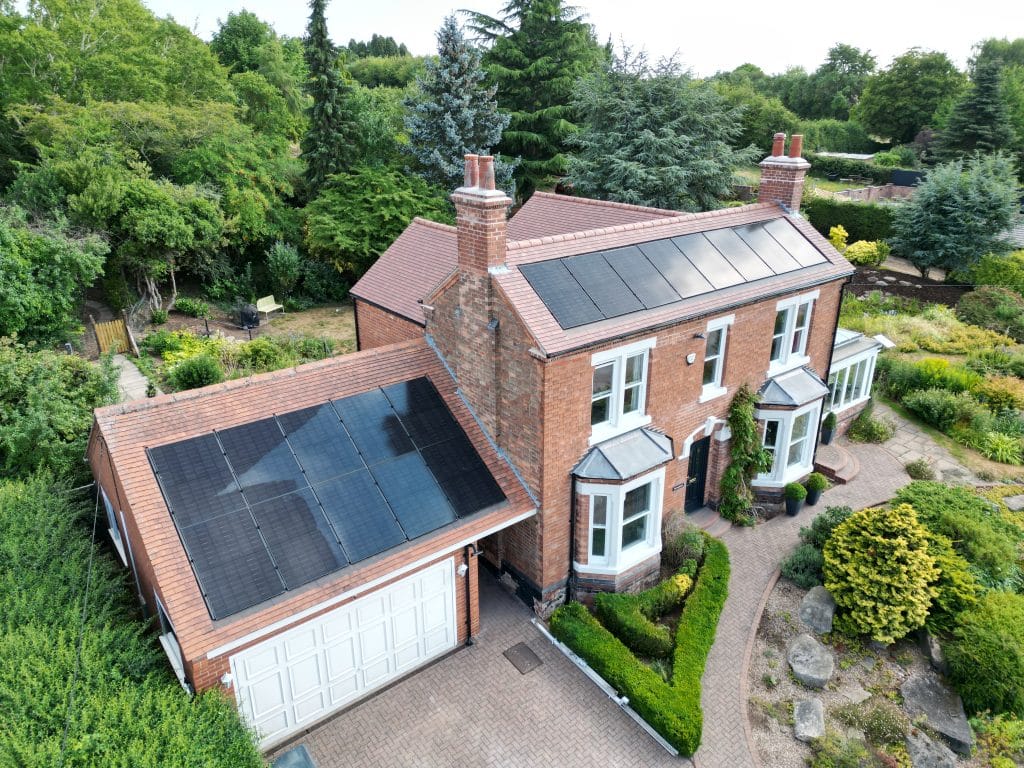
Most domestic solar installations in the UK proceed under permitted development rights, requiring no formal planning applications. Permitted development allows roof-mounted panels provided they don’t protrude more than 200mm beyond roof planes, don’t exceed roof height, and avoid installation on primary elevations (front-facing slopes) of properties visible from highways.
Listed buildings and properties within conservation areas require planning consent regardless of permitted development rights. Our team handles planning applications when necessary, preparing detailed submissions addressing heritage considerations and visual impact assessments. Approval rates remain high when applications demonstrate sympathetic design and minimal visual intrusion.
Building Regulations compliance applies to all solar installations, covering structural adequacy and electrical safety. MCS-accredited installers like Spectrum automatically ensure Building Regulations compliance through standardised procedures and documentation, providing necessary certification upon completion. This compliance protects warranties, insurance validity, and property values whilst ensuring safe, legal installations.
Ground-mounted systems have different permitted development criteria, typically allowing arrays under 9 square metres without applications, provided they’re positioned appropriately relative to boundaries and highways. Our design consultations address all regulatory requirements specific to your property and installation type.

Solar Maintenance & Warranties
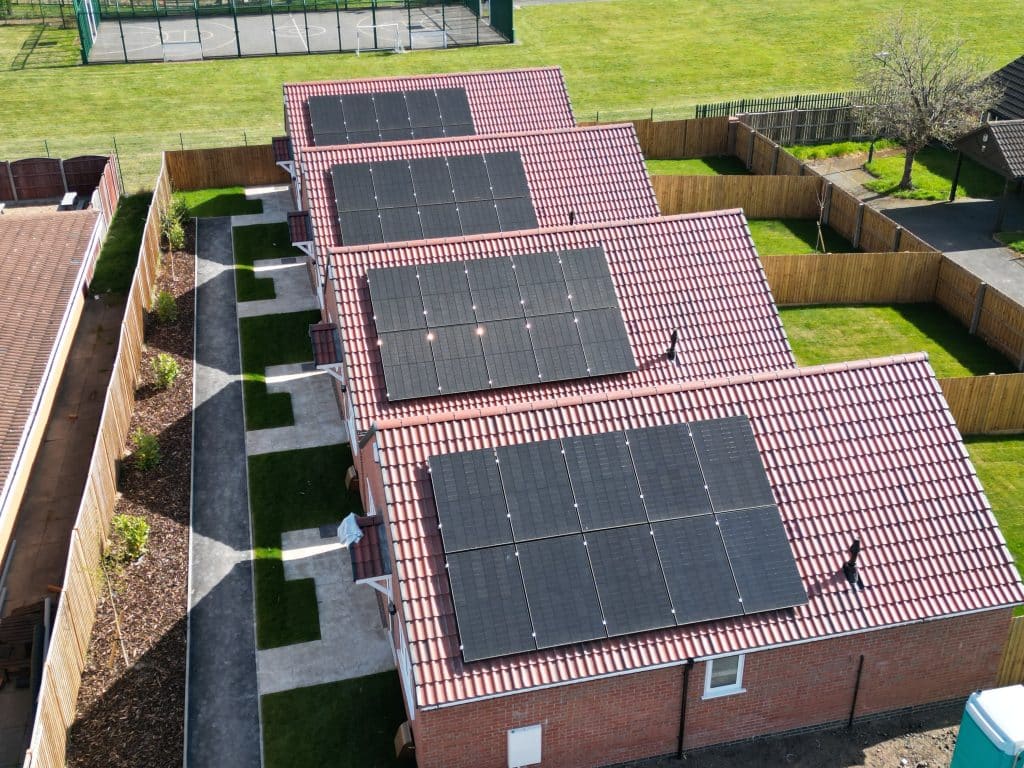
Solar panel systems require minimal maintenance compared to other home improvements, though regular attention optimises performance and longevity. Annual visual inspections identify potential issues early—checking for physical damage, loose connections, or vegetation growth affecting panels. Professional maintenance services include comprehensive system health checks, electrical testing, and performance verification.
Panel cleaning frequency depends on location and environmental factors. Urban and rural locations near roads benefit from cleaning 1-2 times yearly, removing traffic film, agricultural dust, or stubborn bird droppings that rain alone doesn’t eliminate. Clean panels can deliver 5-15% more electricity than neglected installations, making periodic cleaning worthwhile investments.
Modern solar panels typically carry 25-year performance warranties guaranteeing 80-85% output after 25 years, plus 10-15 year product warranties covering manufacturing defects. Inverters generally warrant 5-10 years initially, with extended warranties often available. Battery warranties typically cover 10 years or specified cycle counts—whichever occurs first.
Our installations include comprehensive workmanship warranties and MCS-backed insurance protection. This multi-layered coverage ensures long-term protection and peace of mind. We maintain ongoing relationships with clients, providing health check and servicing packages that maintain optimal system performance throughout 25+ year lifespans.

MCS Accreditation & Quality
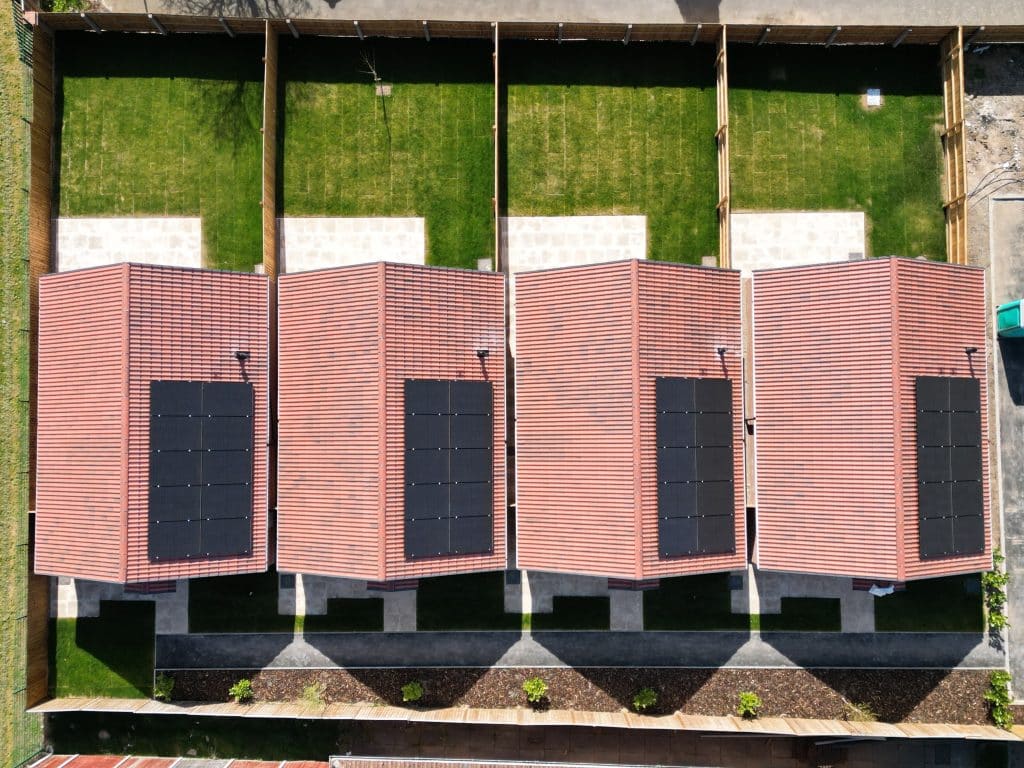
MCS (Microgeneration Certification Scheme) accreditation represents the UK’s quality assurance standard for renewable energy installations. MCS certification ensures installers meet rigorous competency requirements, follow standardised procedures, and deliver installations compliant with Building Regulations and industry best practices. Only MCS-accredited installations qualify for government incentives like SEG export payments.
Spectrum Energy Systems maintains full MCS accreditation, demonstrating our commitment to professional standards and quality delivery. Our engineers complete continuous professional development, maintaining current knowledge of technologies, regulations, and best practices. NICEIC electrical certification ensures all electrical work meets Part P Building Regulations, providing additional safety assurance and regulatory compliance.
We’ve served the East Midlands since 2011, completing hundreds of domestic installations across Nottingham, Derby, Leicester, Lincoln, and surrounding areas. This established presence provides accountability and accessibility—we’re local, approachable, and committed to long-term customer relationships beyond initial installations.
Our manufacturer-agnostic approach prioritises your needs over supplier relationships. We source components from proven Tier 1 manufacturers offering genuine warranties and UK support networks, avoiding inferior products or brands lacking long-term viability. This independence ensures recommendations based solely on performance, reliability, and value rather than commission structures or supplier preferences.

East Midlands Coverage
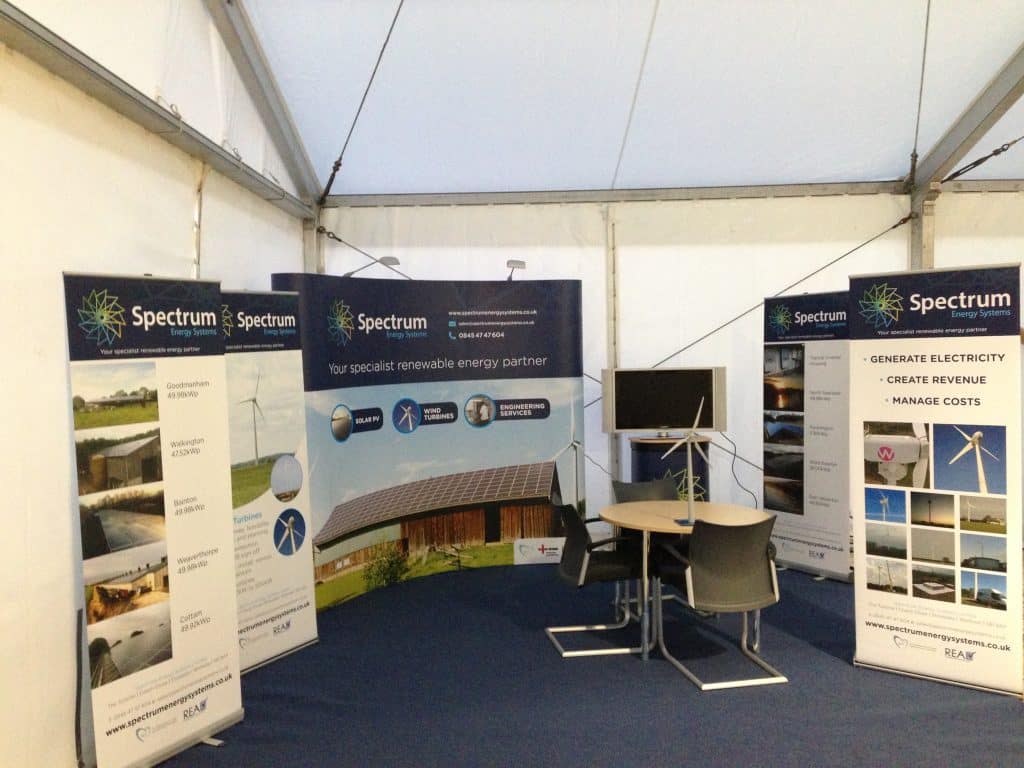
Based in Nottingham, we provide comprehensive domestic solar panel installation services throughout the East Midlands region. Our local presence enables rapid response times, personal service, and deep understanding of regional factors affecting solar performance—from typical weather patterns to local authority requirements and DNO processes.
We regularly install systems across Nottingham, Derby, Leicester, Lincoln, and the wider region, serving urban, suburban, and rural properties. This extensive local experience means we understand roof types common to East Midlands housing stock, local planning considerations, and energy consumption patterns specific to our region.
Local installation teams travel from our Nottingham facility, minimising travel times and carbon footprints whilst ensuring engineer familiarity with regional building practices. Ongoing support and maintenance services benefit from our proximity—we’re available locally when you need us, whether for routine maintenance, system monitoring reviews, or addressing any concerns.
Explore our case studies showcasing recent East Midlands installations, demonstrating our capabilities across various property types and system configurations. These real-world examples illustrate how we’ve helped neighbours like you achieve energy independence and financial savings through professional solar solutions.

Domestic solar FAQs
How long do solar panels last?
Quality solar panels typically last 25-30 years with minimal degradation, usually retaining 80-85% efficiency after 25 years. Inverters generally require replacement after 10-15 years. Proper maintenance extends component lifespans and maintains optimal performance throughout system life.
Do I need planning permission?
Most UK domestic solar installations proceed under permitted development rights without formal planning applications. Exceptions include listed buildings, conservation areas, or installations not meeting permitted development criteria. We handle all necessary planning applications and regulatory compliance.
Will solar panels work during UK winters?
Yes, solar panels generate electricity year-round, including winter months and cloudy days. Whilst summer generation significantly exceeds winter output, annual production delivers substantial electricity bill reductions. Modern panels perform efficiently in diffuse light conditions common during UK winters.
What happens during power cuts?
Standard grid-tied systems shut down during power cuts for safety reasons, preventing dangerous backfeed to grid infrastructure. Battery storage systems with backup functionality can provide emergency power to selected circuits during outages, maintaining essential services.
Can I add battery storage later?
Yes, most modern inverters accommodate future battery additions through hybrid functionality or AC-coupled battery systems. Whilst upfront installation proves more cost-effective, retrofit battery integration remains viable, allowing phased investment as budgets and needs evolve.
How much can I earn from exporting electricity?
SEG export payments typically range from 4p-15p per kWh depending on your chosen tariff. Average export earnings for a 4kW system might be £50-£150 annually, depending on export volumes, chosen tariff, and consumption patterns. Actual earnings vary significantly based on self-consumption levels.
Do solar panels require maintenance?
Solar systems require minimal maintenance—typically annual visual inspections and occasional cleaning. Professional health checks every 1-2 years ensure optimal performance and early problem identification. Our maintenance packages provide comprehensive system care.

